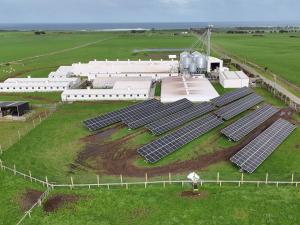Canterbury farmer Sean Molloy joins New Zealand Pork board
Following a recent director election, Canterbury farmer Sean Molloy has been appointed to the New Zealand Pork Industry Board.
 The panels with 200kw capacity have been installed in a paddock at the farm at Oaonui, near Opunake.
The panels with 200kw capacity have been installed in a paddock at the farm at Oaonui, near Opunake.
Installing 400 solar panels at their Taranaki piggery and cropping operation will have significant environmental, financial and animal welfare benefits for the Stanley family.
The panels with 200kw capacity have been installed in a paddock at the farm at Oaonui, near Opunake.
Karl Stanley, who runs the long-established farm with family members, expects the power generated will initially supply about 70 per cent of their daily energy use, with the aim of expanding that to 100% soon.
“We will be feeding the power straight to the piggery rather than selling it to the grid because we get a greater benefit that way,” says Stanley, who estimates the payback time on the investment will be just over four years. The family’s electrician Sinclair Electrical installed the panels.
“Currently our power bills are around $110,000 a year and we expect to cover about $65,000 to $70,000 of that to start with. Most of our power is used during the day, so this makes total sense.”
The indoor piggery has around 500 sows and 5,000 grower pigs at any one time and the major power costs to the business are heating to provide the ideal temperature for their pigs, as well as ventilation, lighting and running electronic equipment such as feed mills.
“The cost savings were the major attraction but it also means less impact on the environment. We all want to reduce our footprint but it has to stack up financially. If it makes sense financially, then we want to do it.”
Having land-based panels in a paddock, like many solar farms, means the land can also still be used for grazing.
“We’ll still be grazing sheep in there and the panels have the additional benefit of providing shelter and shade so the animals can be nice and cool in summer and get under cover if it rains. It’s an ideal use of the land while we’re getting electricity out of it at the same time.”
Previous innovations carried out on the farm have already been recognised with the Stanleys among winners in the 2020 Taranaki Ballance Farm Environment Awards and the Hills Laboratory Agri-Science award.
The farm has not used any commercial fertilisers for decades. Instead, effluent produced in their indoor piggery is piped to land through an irrigation system. The maize, hay and silage produced as a result is sold to other local farms, which means it doesn’t have to be trucked in from further away.
Other measures to reduce energy use include converting all lighting in the business to LED.
“We’ve been doing the baby steps,” says Stanley. “But this is a big leap.”
NZPork is working with farmers to achieve a carbon neutral commercial pig farming sector by 2050.
The comparatively small environmental footprint of commercial pork farmers in New Zealand is a significant attribute of the sector. Pig farming currently contributes just 0.2% of New Zealand’s total Greenhouse Gas agricultural emissions.
Global trade has been thrown into another bout of uncertainty following the overnight ruling by US Supreme Court, striking down President Donald Trump's decision to impose additional tariffs on trading partners.
Controls on the movement of fruit and vegetables in the Auckland suburb of Mt Roskill have been lifted.
Fonterra farmer shareholders and unit holders are in line for another payment in April.
Farmers are being encouraged to take a closer look at the refrigerants running inside their on-farm systems, as international and domestic pressure continues to build on high global warming potential (GWP) 400-series refrigerants.
As expected, Fonterra has lifted its 2025-26 forecast farmgate milk price mid-point to $9.50/kgMS.
Bovonic says a return on investment study has found its automated mastitis detection technology, QuadSense, is delivering financial, labour, and animal-health benefits on New Zealand dairy farms worth an estimated $29,547 per season.

OPINION: Here w go: the election date is set for November 7 and the politicians are out of the gate…
OPINION: ECan data was released a few days ago showing Canterbury farmers have made “giant strides on environmental performance”.